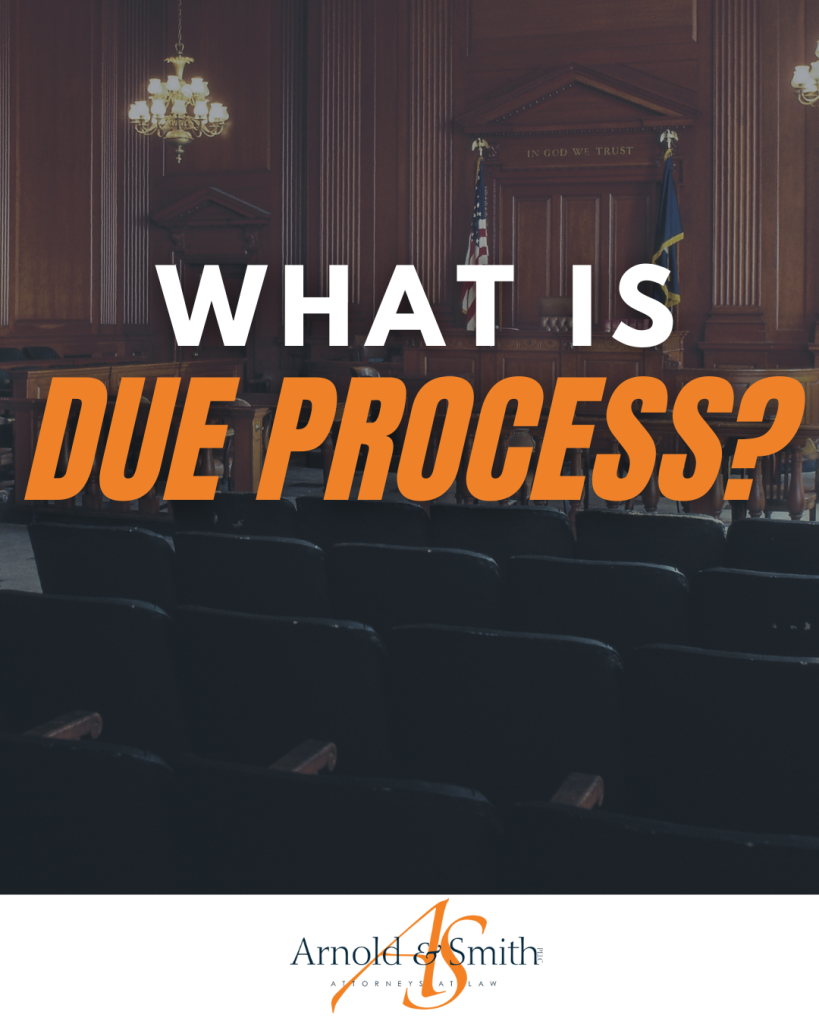Federal and state laws require everyone to be treated equally and fairly. There has been much talk about due process, and many people are wondering exactly what it is. Due process is a term that is common language among attorneys and judges and in courtrooms across the country. People who live in the United States have the right to a fair legal process.
Fundamental Rights
Some rights are part of the fabric of our society in the United States. Our fundamental rights are provided to us in the U.S. Constitution as well as in the North Carolina Constitution. Life, liberty, and access to our personal property are basic rights that are inherent in the laws of our country. In addition to fundamental rights, individuals are entitled to fair treatment and afforded the proper processes as required under the law.
The Fifth Amendment of the U.S. Constitution states that no person should be deprived of life, liberty, or property without due process of law. The Fourth Amendment of the United States Constitution affords “the right of the people to be secure in their persons, houses, papers, and effects, against unreasonable searches and seizures, shall not be violated, and no Warrants shall issue, but upon probable cause, supported by Oath or affirmation, and particularly describing the place to be searched, and the persons or things to be seized.”
Basic Due Process
Under United States law, those who are accused of a crime are considered innocent until proven guilty. The law requires individuals to be processed through legal channels to the conclusion of their case. The legal process in which to determine the guilt or innocence of a person is due process – the rights that are due to every person as part of United States law. The law requires the adjudication of an individual, and only then can a sentence be made. If a person’s rights are violated before they have been given the ability to defend themselves in court, it may be an infringement of due process.
Substantive and Procedural Due Process
Due process can be categorized as substantive or procedural. Substantive due process applies to the limit of laws that infringe upon a person’s basic rights, such as their right to freedom. Laws must always ensure that they do not impede these rights. Procedural due process means that the application of law in legal proceedings must always comply with a person’s rights. For example, a person cannot be sent to jail without going through the legal adjudication process. To do so would be a violation of due process.
Due Process in Criminal Cases
Every defendant has the right to defend themselves against criminal charges. The legal system affords those accused of a crime the ability to go through a fair legal process from start to finish. The outcome of the case should not be tainted by withdrawing or withholding a person’s right to the legal procedure. This includes the right to a fair trial. The introduction of evidence in the trial must not violate the defendant’s rights. For example, if evidence was improperly obtained, it should be excluded so as not to improperly prejudice the case.
A knowledgeable criminal defense attorney will help protect your rights and ensure that you will maintain due process in your case. If you are facing criminal charges, we can help. Contact us today at Arnold & Smith, PLLC, at (704) 370-2828 for a consultation.
The criminal defense attorneys at Arnold & Smith, PLLC make it their mission to zealously defend their clients on a wide range of criminal matters at both the state and federal levels. These matters may include any charge from traffic offenses; DWI/DUI; drug charges (from simple possession to possession with intent to distribute and trafficking); gun permit denials; weapons offenses; and property crimes (larceny, breaking and entering, robbery, fraud, embezzlement, white collar offenses); to sexually related offenses (indecent exposure; sexual assault, crimes against nature, removal from sex offender registry); and violent crimes (domestic violence; assault; manslaughter; homicide, murder). Other legal issues that Arnold & Smith, PLLC criminal clients may face include restraining orders, restraining order and probation violations, expungements; appeals; and immigration issues related to criminal charges. Our criminal defense attorneys are passionate about ensuring that individuals empower themselves by being informed about their constitutional rights and stand at the ready to fight in defense of those facing criminal charges.
Source:
https://constitution.congress.gov/constitution/amendment-4/
Image Credit
See Our Related Video from our YouTube channel:
Arnold & Smith, PLLC – YouTube
See Our Related Blog Posts:
What Should I Do About My Social Media during a Trial?
 Charlotte Criminal Lawyer Blog
Charlotte Criminal Lawyer Blog



